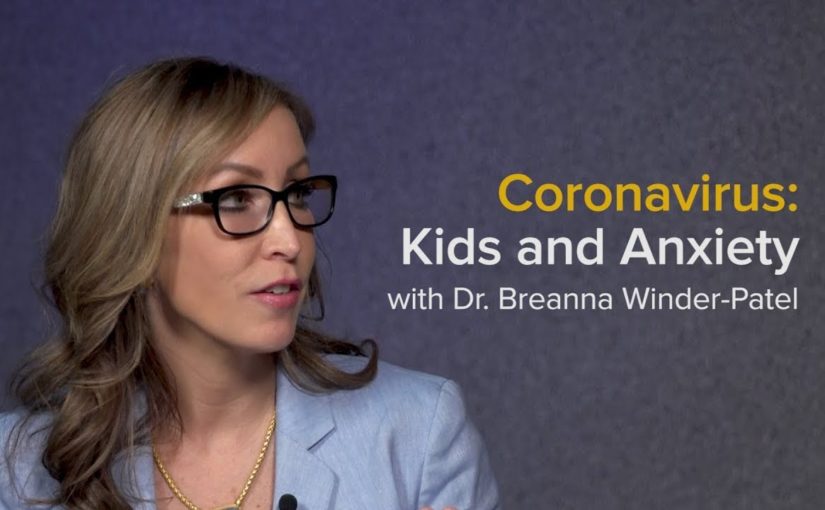Coronavirus: Kids and Anxiety During the COVID-19 Pandemic
So I wanted to mention that and she has a similar practice to mine at MIND. What we're seeing is that you know this is a time of high-anxiety for a lot of people. What underlies anxiety is we think of, has a lot to do with fear of uncertainty and worries about uncertainty, and obviously there's a lot of uncertainty for us at this time. So we would expect people to have some anxiety that's higher and that's a way that we're sort of designed to look out for dangers. Some people are having some anxiety that's even excessive for what's going on. And we have you know a mechanism called the fight, flight or freeze mechanism, that we all have for when we're in a true danger. And it's important for that to go off if like a bus is coming towards you or something like that.
But it's not, we have that go off as like a false alarm sometimes and I think that's happening some. So what we're seeing in our practice is some of the kids are talking about the coronavirus in ways where they're pretty anxious about it. But actually some aren't as anxious as they usually are because the things that make them anxious, like separating from their parents or interacting with peers. They're not doing right now, they're kind of at home in their safe space. It's a lot of transition to move to the video visits so that's been part of what we're trying to work on to continue to provide care. – What can parents tell children who are anxious about the coronavirus? – Yeah, so we want children to have you know specific fact-based information. So there are a lot of myths kind of going around and information that can be really scary for kids, and it's best to not completely keep them in the dark.
But give them some information so they understand like the true honest effort that they're parent is giving to let them know about it. So for example, we would want kids to know things like you know we would want them to understand that people have viruses all the time and that the difference with this virus is that we don't want so many people to get it at once, so that the hospitals and the doctors are just too busy. So we're all really working hard to stay at home from school and home from work to give them the space they need to work on this virus. And for a lot of kids that's kind of enough information obviously, it depends on their cognitive and language level. But it's not something we need to be talking about all day.
So you know it can be, provide some information try to get in there and see if there's any myths the kids are walking around with, and then move on to something more fun and relaxing like movie or a family game. – So it's not just you sort of delivering this information to your child, but you said to sort of ask if they are thinking of any thing that we know to be myths. So it's really like encouraging a discussing and maybe would you ask a child say. Honey what do you know about the coronavirus? – Yes, because we don't wanna assume that they're having certain thoughts about it that they're not. I had one child actually convey to me that, and this is a child with autism that the biggest worry was the visual image of what everyone's putting up there that the coronavirus, you know the depiction of what the virus would actually look like.
– Oh the ball? – Yeah. So if you think about that ball you know, it is a scary looking ball with red pointy things coming out of it. You know and the child's fear wasn't about getting the virus or dying. The fear was about like, that thing looks really evil and I don't want that inside of my body. So they're interpretation of what's going on really to this virus, was a little bit different than what you would expect.
And so you have to really see you know what is your own child thinking about versus assuming that everybody is just worried about getting it, 'cause that might not be it. – That's really interesting information that parents would wanna tease out. – Yeah. – Well since schools are closed and there is an important focus on the social distancing, which is why we're sitting not closer together. We're sitting this far apart at this table right now. What would be helpful for parents to include in their daily routines with their kids being at home? – Yeah so since this is a time of uncertainty we would want to be able to provide them with the most kind of structure and routine in ways that they're familiar with, so that they feel like they know what's coming. So we would encourage parents to try to put some routine in place at home like similar wake up times, knowing when meals are coming. You know knowing if school work is expected at a certain time and when the fun time is gonna come.
We also, you know, I'm hearing a lot of information about parents who are expected to work from home in addition to taking care of their children, in addition to teaching their children. And it's just so entirely unrealistic to put the pressure of some like idealistic schedule on these families. So I think the idea is to try to keep some structure for the child. But also to be really flexible and kind of you know easy on yourself that that's not gonna happen in a perfect way everyday and we're expected to all do things that are really unfamiliar to us.
You know it might be a time if the child is really struggling to do the traditional way of learning. Maybe it's a time to focus on experiential learning that's where we think of teaching them hands-on things like how to measure the ingredients for you know what they're making, or going outside for a walk and trying to identify trees or flowers that we know of. You know that type of learning is really important too and parents are actually doing that a lot of the time they might not realize that. And the other thing is to think about you know are there things that you really loved as a child that were really meaningful and maybe this is a time to do it. Like you know I was a big fan of like making forts and doing scavenger hunts and all of these things. And at the end of this we want kids to be able to look back and not feel like wow that was so much tension the whole time.
We want it to be able to be like well, it was kinda stressful for everyone but I had some really great experiences with my family and I learned, and now I have some great memories. So it's a balance and we have to be kinda easy on ourselves at this time. – That is such good advice I think so many families need to hear that right now. – Yeah. – We've been talking about routine you talked about sort of developing a flexible schedule 'cause kids like to know what's coming. A lot of children and people, adults too with neurodevelopmental disorders really thrive on routine and for a lot families their home life has just been completely upended by this. So what are some of the special challenges for families who have a member of the family with a neurodevelopmental disorder? – Yeah. Well I mean I think the biggest one is that you know in our world in my field we talk about we don't expect the parents to be the therapist.
We expect if you need a therapist you go to a therapist. And the same with parents being teachers, if you're not a teacher that's a really big responsibility to put on a parent. And now like parents are everything. (laughs) – Yeah they're right. – Right now for children with neurodevelopmental disorders that have in-home services that have been suspended. They're not getting that support they need and they're not getting those therapists and they're kind of mean to be the therapist and the teacher. So I think the challenges are that really the support.
A lot of times individuals with neurodevelopmental disorders have a lot of extra therapies and interventions that aren't happening right now. So we would encourage parents to you know keep with those strategies as they can, and see if there's other resources they can get through you know if they have any option for video visits with the provider, and you know there's a resource we're going to mention that the MIND Institute, faculty of the MIND Institute developed that might be helpful as well. So I think it's the extra challenges are probably related to you know really feeling like they were so used to that routine and what they did everyday, going to school going to therapy and having trouble understanding you know why is this so different and why don't we have a choice right now.
– So again just kind of being supportive of them trying to include things they really enjoy. Include their special interests in their day. One thing we talk about is that if a child has a special interest in something it could help you explain the pandemic to them. So for example if they're really into superheroes you could say well the healthcare workers are kind of like Iron Man, and their job right now is to go after this thing that they're trying to you know fight against, and we need to give them to space to do that. And you know eventually, you know Iron Man defeats the Mandarin just like we're helping the healthcare workers defeat the virus. So sometimes pulling in their special interests can give them some feel like they have some control and some better understanding. But it's really just about trying to keep the routine the same but also being understanding that you know, that's a huge expectation. – Absolutely, you mentioned that sometimes kids might not be as scared as we think they are.
Because we're so immersed in the news and so there is a lot of fear among adults, but kids might not be as scared. For kids who are scared though like the one that you said was scared of the scary red ball entering his body. What can parents do to support those kids and give them a feeling of security? – Yeah great question. So one of the things that we think about with thoughts. If we're having a lot of what if thoughts, that's usually a sign it's an anxious thought. Because we're asking like what if the bad thing happens and we don't know yet cause it's uncertain, it's in the future. So if you're hearing a lot of what if thoughts from the child, you know it's a tendency for parents to just say like oh don't worry or it'll be okay.
But for some kids that reassurance doesn't work and part of why that doesn't work is because they have this thought and it's not going away. So we have a strategy of getting the child to look for proof for their thoughts. So you know if your thought is what if I'm going to get very sick and die.
Looking for proof would be saying things like oh you know is anyone in my house sick? Are we responsible with the physical distancing you know that we're doing? Are we washing our hands? Do I have any proof that I'm actually in a true danger right now? And if that proof isn't there, then we have to question is anxiety telling us the truth. So we talk about externalizing the anxiety and being able to decide whether to listen to it or not. So if you look for proof and you realize you don't really have any, that the anxiety is telling you the truth. Then we encourage children and adults to do something called change the channel in your mind, that's what we call it. So we teach little kids, your mind is like a TV and if you're kinda stuck on the anxiety channel and it's not helpful for you.
We have to kinda let that channel go and switch it over to something that's calming and relaxing. I, this week was like I need to find something personally to change my channel, and so I found the book called Joyful. It's about you know looking around in the physical world and understanding how it impacts inner-joy. So if I'm having these thoughts that are not helpful right now I change my channel to either thinking about the ideas in the book or even like If I can take a break, going and listening to it. I may or may not have been hiding in my closet listening to it last night. (both laughs) – Change it to the joyful channel. – Right right. So it's you know things like this that adults need to implement too because we have the worries as well but we also have many of us the responsibility of taking care of our children.
– Yeah. That leads me actually to my next question. How important it is for adults to sort of model this calm behavior for kids? Because I feel like they really pick up on our energy that way if we're really anxious. – Yeah they do, they're just little investigators. They're very observant and aware more than what we often realize. And I think that there's specific ways they could model some of these skills right now. We think a lot about how problem solving is helpful. So if you have a problem and it can be solved you're going to feel less anxious.
So an example would be if a parent is trying to switch over a doctor's appointment or a class to a video visit and they can do that. They could model for the child, oh mommy had this problem, we're not able to go to the visit so here's what I did to problem solve it and wow I feel better now that I did that. If you can't problem solve something, really the other option is to cope with it in healthy ways. So again like try to switch over to a video visit, it didn't work.
Well, I did what I could and now I just need to change my channel to either listening to music, or playing a game with the family. 'Cause it's not gonna help me to keep worrying about that. So that's something you know that parents can model and really this idea of problem solve something when you can and cope in healthy ways when you can't is probably helpful for all of us right now. – Yeah. – And so it's something that parents you know can model when they can for their children. But also realize that again they're not gonna be the perfect teacher and therapist and everything right now because we just think that's unrealistic. – What additional challenges might there be for people with autism or other neurodevelopmental disorders that we haven't talked about yet? – I think that you know the one that I mentioned is that piece about some individuals with autism have heightened visual abilities and visual memory.
So this piece about you know that child seeing that image of the you know the way they're depicting the virus looking really stuck with him. And maybe not in a way that it would stick with other people. So we have to be careful of what they're being exposed to right now because it's just a lot of information that's confusing. And both on the side of the visual stuff can be difficult for them because if that's something that gets stuck in their mind it can be hard to shift off of it. On the other hand, you know you can do things to help support the visual strengths right now, like having children draw how they're feeling rather than talking to them about it. That's something that we do a lot in therapy with kids with autism to you know get their perspectives on how they're doing. The other things it sort of just depends on the child. There's actually an area of anxiety that we're researching at the MIND Institute. It was developed by a psychologist named Connor Kerns and it's called fear of change, and it's something that we see more often in kids with autism.
So it's this idea of being anxious about changing routines or change in schedules. So the kids that were already having difficulty in that area are probably really struggling right now. They probably never had an experience in their life where their schedule has changed to such an extreme degree. And you know parents have to just do their best to make them comfortable and help them cope and help them find things that will reduce their anxiety like providing a visual schedule for them at home, you know that's reasonable and help supporting them in those ways. – When is it time, at what point should someone go see a professional when their anxiety has gotten the best of them? – So we have a, in the one interview we do.
We talk about when anxiety gets turned on like a light switch and you can no longer turn it off is where you're kinda hitting that point of thinking wow, this is at that level that we might really need to do something about it. And if in the other concept that we think a lot about is interference. So if you just get anxious and you kind of think about it, your parent gives you reassurance and you feel better that's one thing. But if you get anxious and then you know you can't even get on the phone to talk to grandma 'cause you're so anxious and you can't even you know walk outside because you're so anxious. It's that level of interference that often makes the decision of that like is this to that problem point that we'd really need to seek care. I think what's going on right now is that it's more typical than not to feel some anxiety you know. So we would want to you know help support kids during this time and then see once this calms down is the anxiety still staying high, and to help them seek support if so.
– We're not suppose to leave our homes right now unless we are on essential business or running an essential errand. You can still see a provider here at UC Davis Health without having to leave your home. Can you talk to us about video visits and how many more video visits you've been seeing? Yeah, so we, because we're not seeing patients in person our staff in the MIND Institute and also in psychiatry worked really hard to get everything transferred over to video visits. It's a way of doing tele-health that we can do through MyChart. And so all of my therapy patients have been transferred over. It's a little bit strange at first you know, I see some little kids and they're sort of my big head pops up on the screen and they're like ah.
(both laughs) – Right on their tablet or their I-phone at home. – Yeah they're like in their bed or whatever. And so parents have been great about like supporting them and do you want me to stay here 'cause often you know I have a portion of the session with the child just alone. So again it's that idea of flexibility. We have to do a lot of things that don't feel like our usual way of doing things. And most of them have been really great and the patients that I'm, you know I've been underway with treatment and we're in the middle of it. We already have goals we're setting you know they understand the format. It's just that they're sitting at home rather than being in person. Anxiety therapy has a big focus on what we call exposure, so it's about facing the things you're scared of, and Dr.
Meg Tudor and I do a lot of these exposures with patients when they come in. So that's a little tricky because we would do the exposures with the patient first. Like a child who's you know very very scared of germs and doesn't wanna touch doorknobs. We would work with them and encourage them you know to touch a doorknob with us. So if they're not with us in person you know we are being creative about how much we can ask the parents to do at home and how can still get that really important part of therapy addressed.
But we feel like at the very least if we can be supportive and continue to work on our goals that would be one part of consistency in their lives right now. – Yeah. For those of you who are interested in learning more about video visits. You can contact UC Davis Health, contact your provider at UC Davis Health. You can find instructions online on how to do it as well and through what we call My UC Davis online. It's the app or our providers call it MyChart. So you can learn more that way. It's a really really great resource. Let's keep talking about resources. You are involved in something called the STAAR Study. – Yeah so the STAAR Study is, it stands for specifying and treating anxiety and autism research. So it's specific to kids eight to 14-years-old who have autism and have significant anxiety. So right now there is you know a lot of anxiety going on in a lot of people, that'll probably go down when this gets better. For kids that we're looking for for this study it would be kids who have more higher level of anxiety that's kind of persisting and we have this treatment study.
So the study is that if they qualified for the screening criteria they would be randomized to either cognitive behavioral therapy or medication group which is sertraline or pill placebo group. And they would see us in the office, the main part of the study is 16 weeks and then there's follow ups. So we right now, since we're not seeing people in person, we aren't doing any of the, starting any of the visits but we are doing the phone screens and we're trying to you know capture information on families that would be interested now, and then we would be able to bring them in when it's safer.
So if people are interesting in that study the contact person is Taron Heckers and her phone number is 916-703-0119. – So if you're interested you can learn more that can be available to you. – Okay, yeah that's great. – MIND has a new web platform too for, that contains resources for families and caregivers of kids with autism and it's really excellent for shelter and place time. – Yes, it is called helpisinyourhands.org. So that's actually the website helpisinyourhands.org, and it's a free website that was developed by doctors Aubyn Stahmer and Sally Rogers of the MIND Institute. And it was developed to help caregivers with skills to assist them in working with their children with autism. So it's based on the early start Denver model. Which is something that that's the model they've been working on and researching for a long time. – Is that the early intervention? – Yes. So this is targeted towards children who are like zero to three years of age very young children and the website has these video modules that can kind of show you how you could work on some of these skills with your child with autism or showing signs of autism.
And I signed up on it today to you know that a thorough look, it's very easy to sign up. It can be used on I believe I-phones, I-pads lots of devices and again it's completely free. – Is there anything else that you'd like to add for our viewers who are dealing with anxiety, sheltering and place? – Yeah I mean one other resource that you know, I don't know if we'll be able to post. But Dr. Pakyurek is our division chief of child and adolescent psychiatry. And he was interviewed by KCRA on you know how psychiatry is handling this as well. I think similar to us we're switching to these video visits. And I think other things are really there's the lovely part of social media right now is that parents are posting a lot of really creative things that people can do with their kids at home. You know some examples I've seen are you know I mentioned my favorites of my scavenger hunts and my forts. But there's a website where celebrities will read books to your children.
There's another website where a famous children author will do doodle, do a doodle that your, and it's kind of you know he's doing it kind of live and your children can do it, and there's zoos that are showing animals. So we don't want people to you know slip into doing a massive amount of screen time because we want kids to get physical activity, and to get these productive activities. But there's been some pretty creative ways set up for children to access you know learning and maybe have some time on screens that could be really fun and really unique. – And productive and comforting to kids and parents alike. – Yes yes.
– [Interviewer] So someone asked that their granddaughter's anxiety is surfacing in the way of controlling behavior regarding her classwork. Do you have any suggestions on how this person can help their granddaughter prime in order to be ready to do classwork at home versus in the classroom? – So you know I think one thing that can be helpful is before classwork has started to bring right before it an activity that's likely to be more relaxing or settling. So you know depending on what options you have within the boundaries of your house. But swinging on a swing or jumping on a trampoline or doing something physical like that to kind of calm the body and mind and get it ready for the work.
The other thing is maybe it's just confusing what's expected at home or the work times are a little bit longer than what the child's used to. So maybe starting out with just doing like a few problems and saying we do a couple minutes and then we take a break and we get a fun reward to help start this you know new process that she's probably not used to doing. – So really, I mean it's just a time of change for everyone. – Yes, yes. – And your message of flexibility I think is so important. – Yeah and you can even get really specific about flexibility. So I've talked to a few kids on my video visits this week about like that do you know what flexibility means, and couple of them were like nope. (laughs) And I'm like well, it means you know when there's something that we're used to doing one way and we really are encouraged to do it another way to sort of be willing to try.
You know for the sake of maybe yourself or the family. So you can even say to kids like you know, something I might say is well this morning I had to be flexible when my child was like tapping on my face and asking me to sing Old McDonald before it was wake up time. – How fun for you. – So yeah. So I was flexible this morning so now I'm asking you to you know sit down do this or you know eat your lunch at a time you're not used to. Let's see if you can get some flexibility points. And you can you know reinforce them by giving them points for it and making it kinda like a game like who can be the most flexible today. Because they think that's so much of this adapting and being flexible is just not something where you know kids are like really used to working on. And so if we explicitly describe it to them and then give them a chance to try it, that might help as well. – For more coronavirus information from our reliable sources here at UC Davis Health, please visit health.ucdavis.edu/coronavirus.
Thanks again for being with us. (soft music).


 Read more:
Read more: 

 Read more:
Read more: 



 Read more:
Read more: 












 Read more:
Read more: 




















